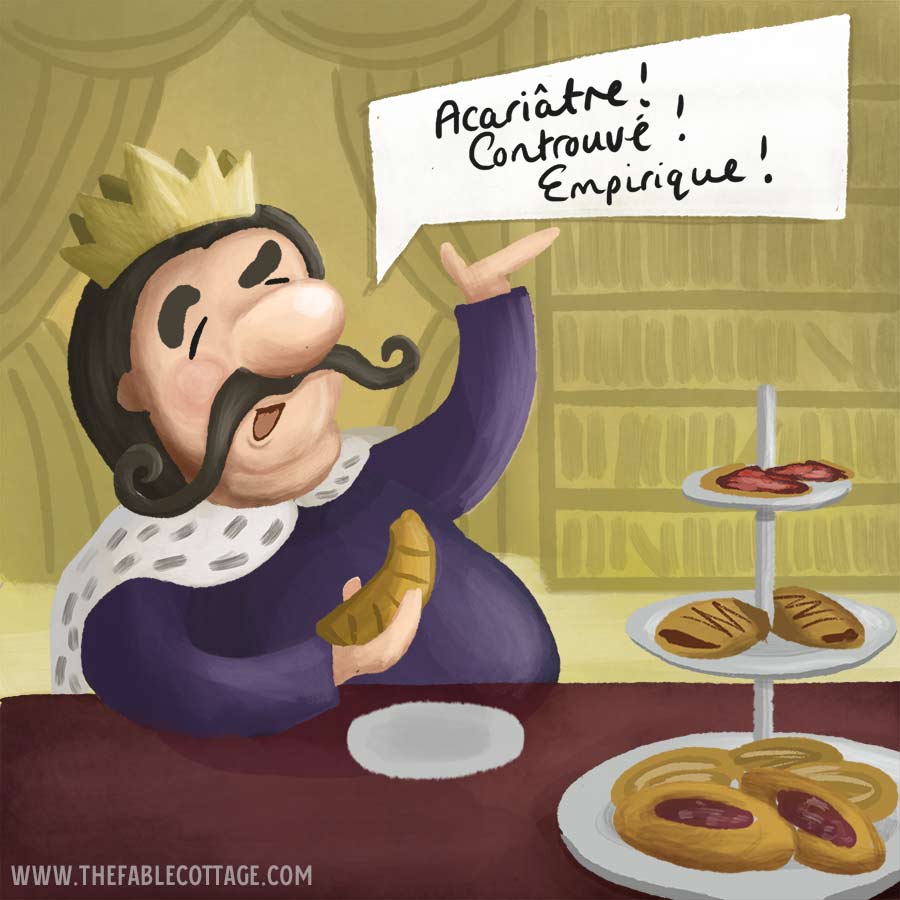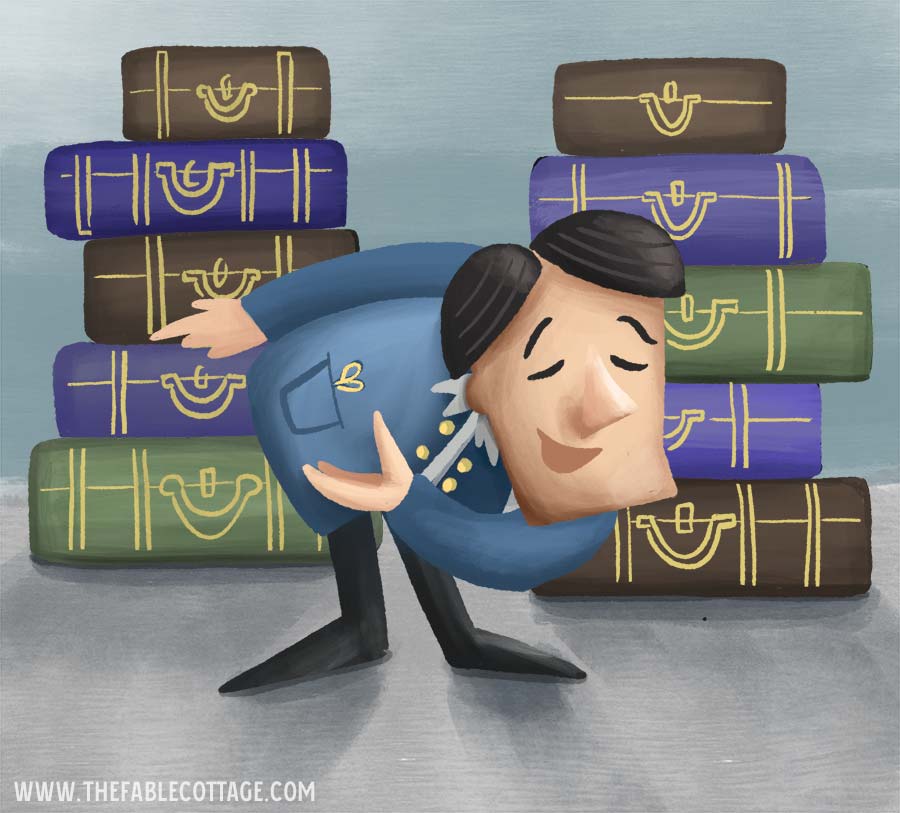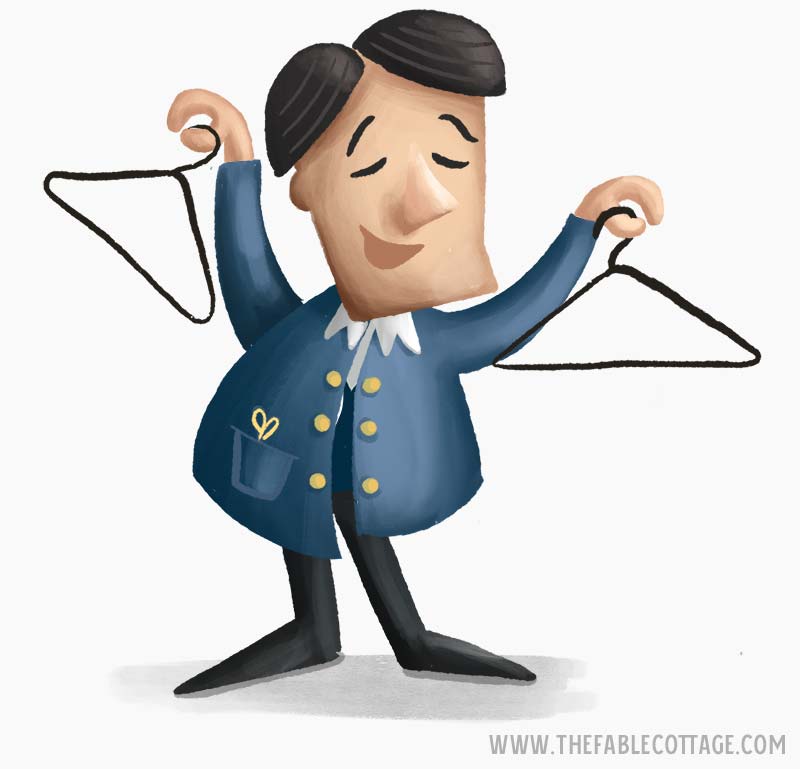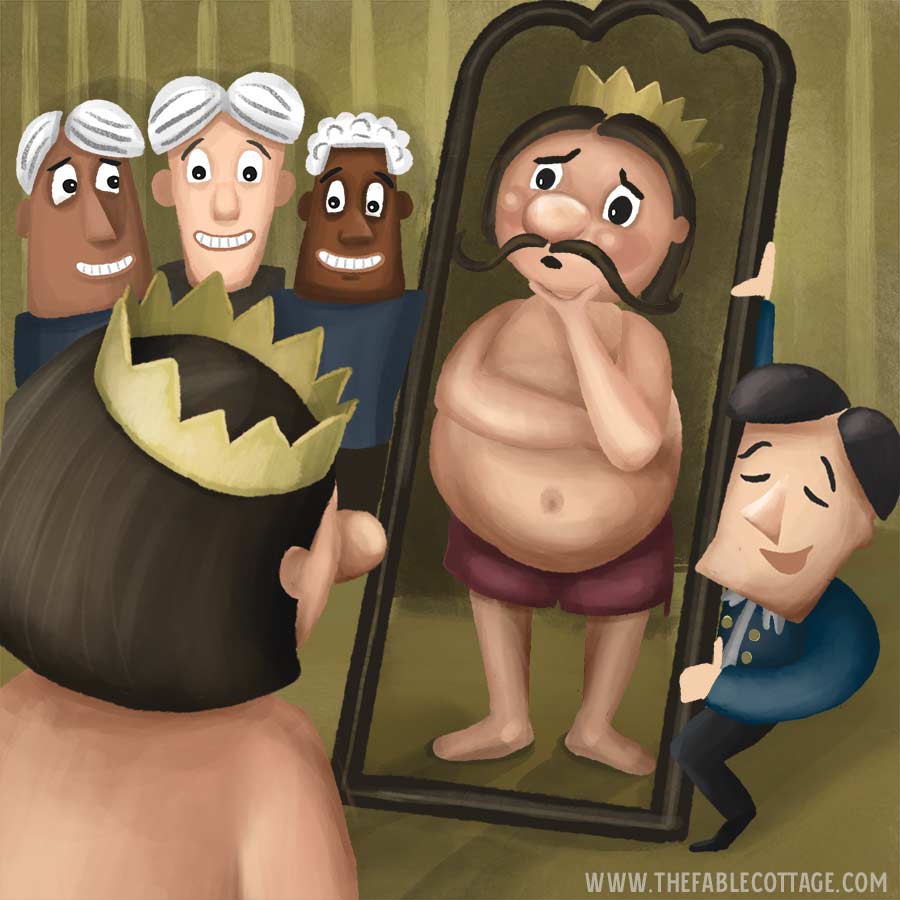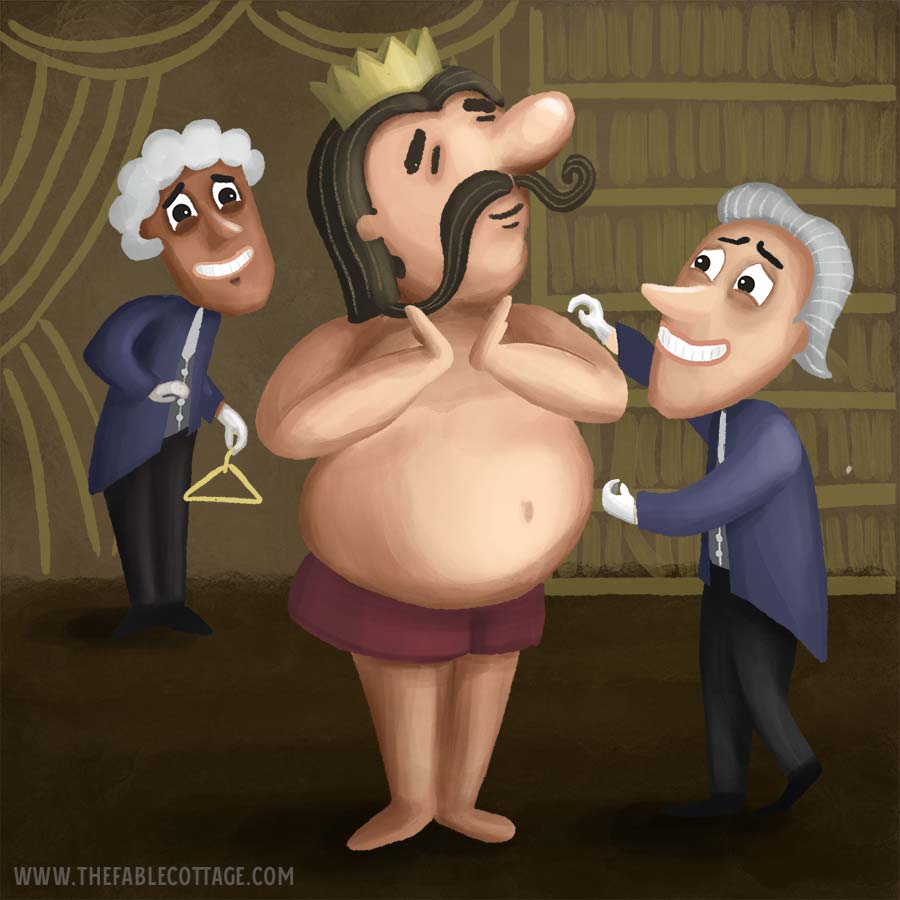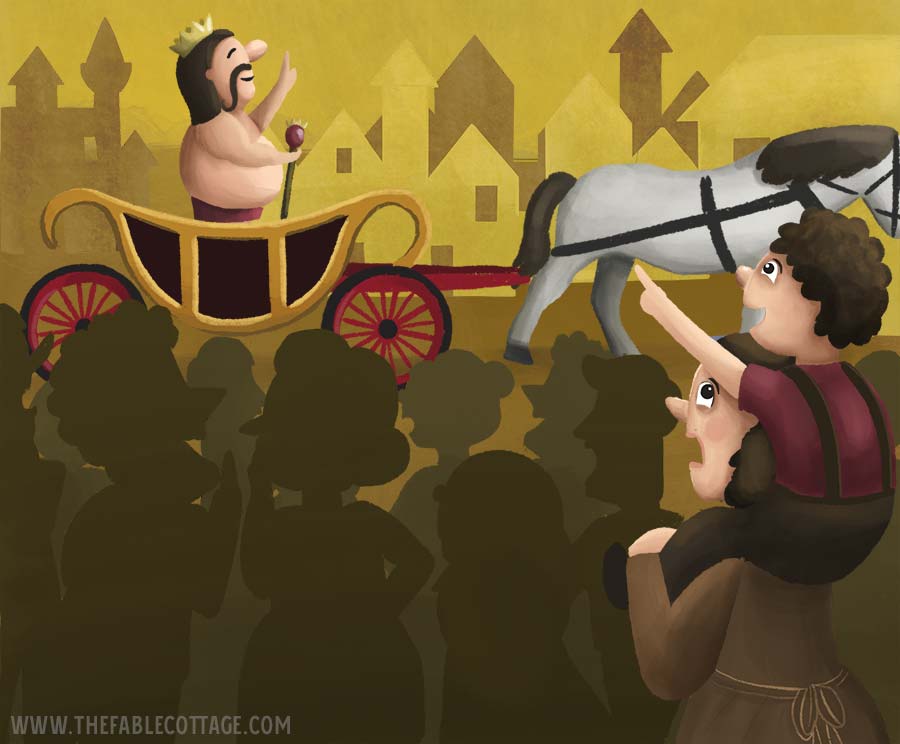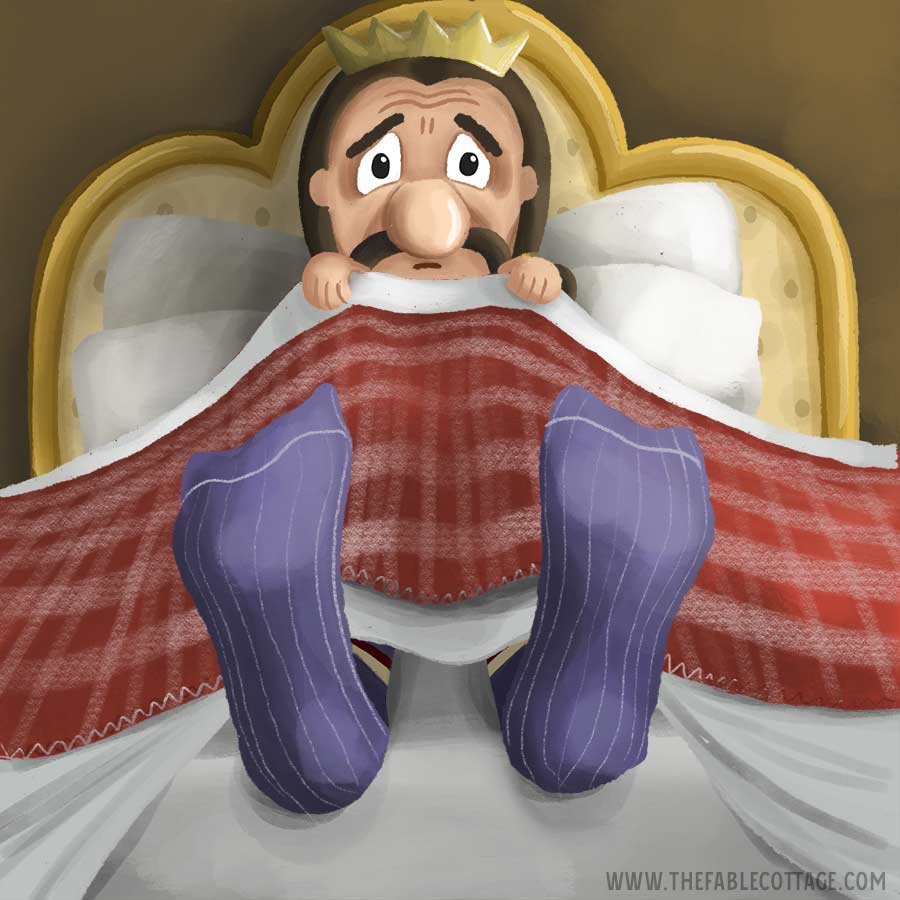Il était une fois un empereur. Il avait le ventre rond, des sourcils broussailleux et une très longue moustache. Mais il était très vaniteux. Il ne pensait qu’à lui.
Once upon a time there was an emperor. He had a round belly, bushy eyebrows, and a very long moustache. But he was very vain. He only thought about himself.
« Je suis tellement magnifique ! », disait-il. « Regardez mes magnifiques sourcils ! Regardez mon excellente moustache ! J’ai l’air formidable ! »
“I am so wonderful!” he would say. “Look at my wonderful eyebrows! Look at my excellent moustache! I look tremendous!”
L’empereur aimait porter des habits raffinés. Il avait quatre cents chemises raffinées, trois cents paires de pantalons raffinés et mille paires de chaussettes raffinées.
The emperor loved to wear fancy clothes. He had four-hundred fancy shirts, three-hundred pairs of fancy pants, and one-thousand pairs of fancy socks.
Il aimait également utiliser des mots raffinés. Comme ‘acariâtre’, ‘controuvé’ et ‘empirique’.
He also loved to use fancy words. like ‘cantankerous’, ‘spurious’, and ‘empirical’.
(Il ne savait pas ce que les mots raffinés voulaient dire, mais il aimait les utiliser de toute façon. Il aimait avoir l’air intelligent.)
« Je suis si INTELLIGENT ! » disait-il. « Je suis un GENIE ! »
(He didn’t know what the fancy words meant (wanted to say), but he liked to use them anyway. He liked to seem intelligent.)
“I am so INTELLIGENT!” he said. “I am a GENIUS!”
Un jour, un homme arriva au palais. Il dit qu’il était tailleur. Il dit qu’il pouvait fabriquer les habits les plus raffinés du pays. (Mais cet homme était en fait malhonnête. Il gagnait de l’argent en trompant des gens riches.)
One day, a man arrived at the palace. He said that he was a tailor. He said he could make the fanciest clothes in the land. (But, this man was actually dishonest. He made money by fooling rich people.)
Le tailleur amena dix valises à l’empereur.
« Votre majesté, majestueuse et intelligente ! » dit-il.
The tailor brought the emperor ten suitcases.
“Your most majestic and intelligent majesty!” he said.
... Chacun sait que vous êtes l’homme le plus intelligent du monde. Et j’ai créé d'incroyables nouveaux habits. Ces habits ne sont que pour les gens intelligents. En fait, les gens stupides ne peuvent même pas les voir... »
Everybody knows that you are the most intelligent man in the world. And I have created some amazing new clothes. These clothes are only for intelligent people. In fact, stupid people cannot even see them...”
L’empereur tapa dans ses mains. « Formidable ! Avec ces habits, je peux savoir qui est intelligent et qui est stupide ! Je ne serai jamais plus ennuyé par des idiots ! Laissez-moi essayer ces habits ! »
The emperor clapped his hands. “Amazing! With these clothes I can know who is smart and who is stupid! I will never be bothered by idiots again! Let me try these clothes!”
Le tailleur déshabilla l’empereur jusqu’à ce qu’il se retrouve en sous-vêtements. Il déballa son mètre ruban. Il mesura les bras, les jambes, les épaules et le tour du gros ventre rond de l’empereur.
The tailor undressed the emperor until he found himself in his underpants. He unpacked his tape measure. He measured the emperor’s arms, legs, shoulders, and all around his big round belly.
Le tailleur fouilla dans l’une de ses valises.
« Non, celle-ci est trop grande ... Non ... celle-là est trop petite ... Ah ! Celle-ci est parfaite ! »
The tailor dug inside one of the suitcases.
“No, this one is too big… No… this one is too small…. Ahh! This one is perfect!”
Il fit semblant de sortir une chemise de la valise.
« Qu’en pensez-vous ? » dit le tailleur.
He pretended to take out a shirt out of the suitcase.
“What do you think (about it)?” said the tailor.
L’empereur eut le souffle coupé. Il ne voyait rien !
« N’est-elle pas formidable ? » dit le tailleur. « Et rappelez-vous ... seuls les gens intelligents pourront la voir ! »
The emperor gasped (had his breath cut). He could not see anything!
“Isn’t it wonderful?” said the tailor. And remember… only intelligent people will be able to see it!”
Le tailleur fouilla à nouveau dans sa valise. « Regardez ce pantalon ! N’est-il pas beau ? Et il est complètement invisible pour les idiots ! Et regardez cette veste ! Vous voyez ces couleurs ? Un parfait imbécile ne verra absolument rien ! »
The tailor dug into his suitcase again. “Look at these pants! Aren’t they beautiful? And they are completely invisible to idiots! And look at this jacket! See the colours? A perfect imbecile will see absolutely nothing! ”
« Oh, oh, oui ... très bien ! » bégaya l’empereur. Mais il était confus. Pourquoi ne pouvait-il pas voir les habits ?
“Oh, oh, yes… very nice!” stammered the emperor. But he was confused. Why couldn’t he see the clothes?
« Il n’est clairement pas possible que je sois un idiot ?! » pensa-t-il. « Un parfait abruti ne connaîtrait pas de mots raffinés comme ... ‘vestibule’ ! ‘Crépusculaire’ ! ‘Saperlipopette’ ! »
“Surely it’s not possible that I am an idiot?!” he thought. “A complete moron would not know fancy words like… Vestibule! Crepuscular! Gadzooks!”
Mais l’empereur ne dit rien.
Le tailleur fit semblant d’habiller l’empereur avec la chemise, le pantalon, la veste et les chaussures invisibles.
But the emperor said nothing (Literally: didn’t say nothing).
The tailor pretended to dress the emperor with the invisible shirt, pants, jacket, and shoes.
L’empereur se mit devant son miroir. Il voulait voir les habits mais il ne voyait que son gros ventre rond et ses sous-vêtements.
The emperor stood (put himself) in front of his mirror. He wanted to see the clothes, but he only saw his big, round belly and his underpants.
« Je ne suis pas sûr que ce soit vraiment mon style ... » dit l’empereur. « Mais laissez-moi demander un deuxième avis. »
L’empereur fit venir trois de ses amis les plus intelligents dans la pièce.
“I’m not sure that it’s really my style…” said the emperor. “But let me get (ask) a second opinion.”
The emperor called three of his most intelligent friends into the room. (Made them come into the room.)
« Mes amis ! Que pensez-vous de ces nouveaux habits ? Seuls les gens intelligents peuvent les voir. Les gens stupides ne voient rien du tout ! »
“My friends! What do you think of these new clothes? Only intelligent people can see them. Stupid people don’t see anything (nothing) at all!”
Bien sûr ses amis ne virent rien non plus. Mais ils ne voulaient pas avoir l'air stupides.
Of course, his friends saw didn’t see anything (nothing) either. But they did not want to seem stupid.
« Oh, oui ! C’est une superbe chemise ! » dit le premier ami.
« Oui ! La couleur du pantalon est parfaite ! » dit le deuxième ami.
« Chouettes chaussures ! » dit le troisième ami.
“Oh, yes! That is a great shirt!” said the first friend.
“Yes! The color of the pants is perfect,” said the second friend.
“Cool shoes!” said the third friend.
L’empereur était excité. « Je vais porter ces nouveaux habits lors de la parade demain », pensa-t-il.
The emperor was excited. “I will wear these new clothes in the parade tomorrow,” he thought.
L’empereur donna beaucoup d’argent au tailleur. Le tailleur quitta le palais avec dix valises remplies d’or. Lorsqu’il se retrouva en sécurité dans sa calèche, il rit fort et longtemps.
« Quel idiot ! »
The emperor gave the tailor a lot of money. The tailor left the palace with ten suitcases full of gold. When he was safely in his carriage, he laughed hard and long.
“What an idiot!”
Cette nuit-là, l’empereur ne dormit pas. Il resta debout tard, à lire les livres les plus gros et les plus lourds de sa bibliothèque.
That night, the Emperor did not sleep. He stayed up late, reading the biggest, heaviest books in his library.
« Il me faut juste quelques mots raffinés de plus, ALORS je pourrai voir mes habits », pensa-t-il.
“I just need a few more fancy words, THEN I’ll be able to see my clothes,” he thought.
Le matin, deux serviteurs vinrent dans sa chambre pour l’habiller pour la parade. Bien sûr, ils ne pouvaient pas non plus voir les habits. Mais ils ne dirent rien. Ils ne voulaient pas avoir l’air stupide.
In the morning, two servants came to his room to dress him for the parade. Of course, they couldn’t see any clothes either. But they didn’t say anything (nothing). They did not want to seem stupid.
Ils firent semblant d’habiller l’empereur avec un pantalon invisible, une chemise invisible, une veste invisible et un chapeau invisible.
They pretended to dress the emperor in invisible pants, invisible shirt, invisible jacket, and an invisible hat.
L’empereur se regarda dans le miroir. Il regarda fixement et plissa les yeux. Il tourna la tête à gauche et à droite. Et ... attendez ... ça y est !
The emperor looked at himself in the mirror. He stared and he squinted. He turned his head left and right. And … wait… there it was!
... Du coin de l’œil, il crut voir un léger tissu scintillant. Un motif à carreaux. Une légère touche de couleur. Il pouvait voir les habits !
... Out of the corner of his eye, he believed he saw a slight shimmering fabric. A checkered pattern. A slight touch of colour. He could see the clothes!
(En réalité il n’y avait pas d’habits. Mais on voit souvent ce que l’on veut voir.)
L’empereur était heureux de pouvoir enfin voir les habits.
« Allons rejoindre la parade ! » cria-t-il.
(In reality, there were no clothes. But we often see what we want to see.)
The emperor was happy that he could finally see the clothes.
“Let’s join the parade!” he shouted.
Tout le monde en ville était à la parade. Toutes les personnes intelligentes étaient là. Tous les scientifiques. Tous les écrivains. Tous les professeurs. Et tous les enfants.
Everybody from the town was at the parade. All the intelligent people were there. All the scientists. All the writers. All the professors. And all the children.
L’empereur se tenait debout dans son carrosse ouvert et salua la foule. Mais alors que le carrosse de l’empereur passait dans la rue, la foule devint silencieuse. La musique s’arrêta. Tout le monde fixa l’empereur.
The emperor stood in his open carriage and waved to the crowd. But as the emperor’s carriage passed in the street, the crowd became silent. The music stopped. Everybody stared at the emperor.
« Ces habits doivent être formidables... » pensait l’empereur.
Mais alors, du fond de la foule un petit enfant cria :
« Maman, je vois ses sous-vêtements ! »
These clothes must be amazing...” thought the emperor.
But then, from the back of the crowd, a small child yelled:
“Mummy, I see his underpants!”
Tout le monde eut le souffle coupé. Puis il y eut quelques fous rires. Puis tout le monde dans la rue se mit à rire de plus en plus fort. Ils applaudissaient et criaient :
« SOUS-VÊTEMENTS ! SOUS-VÊTEMENTS ! »
Everybody gasped (had their breath cut). Then there were a few giggles. And then everyone on the street started laughing harder and harder. They clapped and shouted: “UN-DER-PANTS! UN-DER-PANTS!”
L’empereur entendit la foule rire. Il sut qu’on l’avait trompé. Il ne portait pas d’habits spéciaux. Il ne portait rien – seulement ses sous-vêtements.
The emperor heard the crowd laugh. He knew he had been fooled. He wasn’t wearing special clothes. He was not wearing anything(nothing)—only his underpants.
Il sauta du carrosse et courut jusqu’au palais. Derrière lui, il entendait :
« SOUS-VÊTEMENTS ! SOUS-VÊTEMENTS ! »
Il courut dans sa chambre et claqua la porte.
He jumped out of the carriage and ran back to (ran until) the palace. Behind him, he heard: “UN-DER-PANTS! UN-DER-PANTS!”
He ran to his bedroom and slammed the door.
Plus tard, lorsque ses amis le trouvèrent, il était allongé sur son lit. Il portait tous ses vrais habits : toutes ses chemises raffinées, tous ses pantalons raffinés et toutes ses mille paires de chaussettes.
Later, when his friends found him, he was lying on his bed. He was wearing all his real clothes: all his fancy shirts, all his fancy pants, and all one-thousand pairs of socks.

Download this audio
Need help? How to download audio to your device


